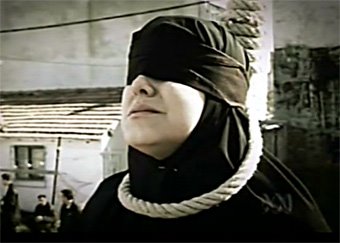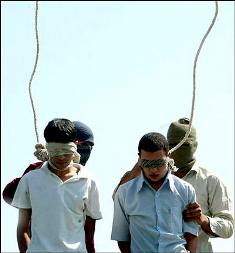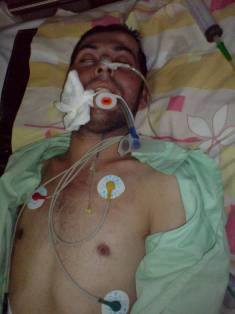Iranian Minorities’ Human Rights Organisation (IMHRO)
Ref.IMHRO.15
2008-06-24
Iranian revolutionary guards opened fire on Turkish farmers after they resisted the confiscation of their lands. According to Germany Deutsche Welle Persian website the attack happened in villages along the Aras River. This was at a time when the High Court had even voted in favour of the villagers.
As a result of shooting Mr. Nor Al Din Dargahi was killed. After that they beat his old father.
After the shooting the revolutionary guards searched every where to find and destroy possible cameras and any photos of the incident.
Among the injured were women and children. When the family went to hospital to visit them, they were beaten by the officers.
IMHRO condemns this massacre and the confiscation of Turkish farmers’ land and asks for a full investigation of this case in order to bring those responsible to justice.
Turk activist killed under torture
Farhad Mohseni Negarestan has been killed under torture while he was being interrogated by the Iranian intelligence service. Aged 25, he was arrested 2 years ago when he was injured by shooting during a demonstration which took place in Azerbaijan, to the north-west of Iran.
The government also have threatened to persecute his family if they speak out about their son’s death. They have also spread rumours that he had committed suicide. His body was buried without having any post-mortem examination.
Some reports suggest he died under interrogation while being subjected to electric shock treatment.
Reza Washahi, a researcher on minorities, told IMHRO that the death of Mr Farhad Mohseni Negarestan clearly shows how Turkish activists are being treated in prison.
IMHRO condemns the murder of Mr Farhad Mohseni Negarestan and asks for a full investigation to bring those involved to account.
Background
Turks in Iran number up to 30 million and face discrimination in many aspects of their lives. Turks in Iran cannot receive education in their mother tongue. It was in 1925 that their area was annexed by Iran.
Sunni minorities among them are also under pressure and suffer discrimination. For example, Sunni farmers do not receive government subsidies or loans.
In recent years after the discovery of oil in this area, the Iranian government started to change its demography by moving non-Turks to this area and confiscating the land of the Turkish people. In Soldoz and Nagahdeh city the government opened fire on a protesting crowd and killed dozens of people, including 17 year old Hussein Fathi Poor.
In recent years the civil movement has developed quickly and many activists including students have been arrested. In the Turkish area free media is banned and local Turkish papers are not allowed to be published.
Action
Please write to one of the following below and express your concern about the recent arrests of Turkish activists in Iran and ask for the immediate release of all Turkish prisoners of conscience in Iran. Please remind the Iranian government that as a state it is party to the international covenant on civil and political rights, which states in article one “All peoples have the right of self-determination. By virtue of that right they may freely determine their political status and freely pursue their economic, social and cultural development.” Therefore they should recognise the rights of Turkish people and other minorities in Iran. Please ask the Iranian government to fully investigate the shooting of farmers and the death of Farhad Mohseni Negarestan and bring those responsible to justice.
Secretary General United Nations
The Honourable Ban Ki-moon
United Nations Headquarters
Room S-3800
New York, NY 10017
USA
Supreme Leader of Iran
Sayyed Ali Khamenei
E-mail via web site
http://www.leader.ir/
United Nations High Commissioner for Human Rights
Ms Louise Arbour
Office of the High Commissioner for Human Rights
Palais des Nations CH-1211 Geneva 10,
Switzerland
Head of the Judiciary
Ayatollah Mahmud Hashemi Shahroudi
Howzeh Riyasat-e Qoveh Qazaiyeh / Office of the Head of the Judiciary
Pasteur St., Vali Asr Ave.,
South of Serah-e Jomhouri,
Tehran 1316814737, Islamic Republic of Iran
Iranian President
Mahmud Ahmadinejad
E-mail via web site
http://www.president.ir/en/
European parliament Human Rights committee
Ms Hélène FLAUTRE
Bureau d'Hélène Flautre au Parlement européen
8G130,rue Wierz
B-1049, Bruxelles,
Belgique
Thursday 19 June 2008
Tuesday 17 June 2008
Amnesty: Fear of forcible return

PUBLIC AI Index: MDE 14/013/2008
29 May 2008
UA 144/08 Fear of forcible return/ fear of torture and ill-treatment / fear of death penalty
IRAQ Sohrab Bawi (alias Imad) (m), aged 33 ] brothers, Iranian nationals from Arab
Mohsen Bawi (m), aged 35 ] ethnic community
Sohrab Bawi (also known as Imad) and his brother Mohsen Bawi, Iranian nationals of Arab ethnicity, are at risk of being forcibly returned from Iraq to Iran. If returned, they would face torture and possibly the death penalty.
In 2006, Imad and Mohsen Bawi were amongst five brothers convicted after an unfair trial of hiding explosives, establishing an illegal group and propaganda against the government (see UA 233/05, MDE 13/051/2005, 9 September 2005, and follow-ups). Imad and Mohsen Bawi were both serving lengthy sentences at different prisons in separate provinces of Iran, but had been given leave from prison to spend time with their family following the execution of their brother, Zamel Bawi, on 29 January 2008. The two men fled to Iraq on 16 February, and were arrested on the border in Basra. They have been held in a detention centre since then, and have appeared at least three times, separately, before a court in Basra, charged with illegal entry into Iraq. Imad Bawi is due to appear again before the Court on 2 June. They are both at risk of being imminently returned to Iran where they would face torture and new charges could be brought against them, resulting in possible death sentences.
The brothers were arrested by the Iranian authorities in August 2005. They come from a prominent family in the city of Ahvaz, in Khuzestan province, western Iran. Mohsen Bawi is an IT consultant and Imad Bawi, a law student, was on vacation from Lebanese University of Beirut at the time of their arrest. The charges against the brothers were connected with a series of bomb attacks in the province of Khuzestan, where most of Iran's Arab minority lives. They were tried behind closed doors and did not receive a fair trial; they were granted only very limited access to legal counsel and Mohsen Bawi is alleged to have been tortured or otherwise ill-treated in pre-trial detention. Their lawyers were notified of the trial date only one or two days in advance, instead of the minimum of five days stipulated in Article 64 of the Civil Procedure Code, and were unable, therefore, to study their clients' files fully before the trial. The two brothers were not allowed to meet in private with their lawyers, despite the latter's requests and a statement made by Iran's Head of the Judiciary on 20 May 2006 that "Nobody has the right to... deprive the accused of the right of visits by their family and lawyer. They must know quite clearly that they may request private meetings with their lawyers."
Imad Bawi was initially sentenced to death in October 2005. This was later commuted to 25 years' imprisonment. Mohsen Bawi was sentenced to 30 years' imprisonment.
BACKGROUND INFORMATION
Much of Iran's Arab community lives in the province of Khuzestan, which borders Iraq. It is strategically important because it is the site of much of Iran's oil reserves, but the Arab population does not feel it has benefited as much from the oil revenue as the Persian population. There were mass demonstrations in April 2005, after it was alleged that the government planned to disperse the country's Arab population or to force them to relinquish their Arab identity. Following bomb explosions in Ahvaz City in June and October 2005, which killed at least 14 people, and explosions at oil installations in September and October 2005, hundreds of people were arrested. Further bombings on 24 January 2006, in which at least six people were killed, were followed by further mass arrests. At least 17 men have now been executed as a result of their alleged involvement in the bombings. It is not clear if another man was executed or died in custody.
As a state party to the International Covenant on Civil and Political Rights (ICCPR), Iraq has an obligation not to return anyone to a country where they would be at risk of torture or other ill-treatment. Furthermore, the international law principle of non-refoulement, a principle binding on all states, prohibits the forcible return of anyone to a country where they would be at risk of serious human rights abuses, including torture.
Four Iranian men, members of Iran's Arab community, are believed to have been forcibly returned from Syria to Iran in 2006 (see UA 132/06, MDE 24/037/2006, 15 May 2006 and follow ups and UA 67/07, MDE 24/018/2007, 16 March 2007). At least one of these men is facing a death sentence.
RECOMMENDED ACTION: Please send appeals to arrive as quickly as possible, in Arabic, Persian, French, English or your own language:
- urging the Iraqi authorities not to forcibly return the two brothers, Sohrab (aka Imad) Bawi and Mohsen Bawi to Iran where they would be at risk of torture and possibly execution,
- reminding the Iraqi government of its obligations under international law that they must not forcibly return individuals to a country where they would be at risk of serious human rights violations, including torture.
APPEALS TO: Email addresses for the Iraqi authorities are proving unreliable. If there is no email address given, or if your email bounces, please send appeals to the authorities via the Iraqi embassy or diplomatic representative in your country, asking them to forward your appeals to:
President
Jalal Talabani
E-mail: questions@iraqipresidency.net
Salutation: Your Excellency
Prime Minister
Nuri Kamil al-Maliki
Salutation: Your Excellency
Minister of Justice
Safi al-Din al-Safi
E-mail: minister@iraqi-justice.org
deputy@iraqi-justice.org
Salutation: Your Excellency
Minister of Foreign Affairs
Hoshyar Zebari
Salutation: Your Excellency
COPIES TO: diplomatic representatives of Iraq accredited to your country. Ask them to send copies to the Human Rights Minister, Wajdan Mikhail.
PLEASE SEND APPEALS IMMEDIATELY. Check with the International Secretariat, or your section office, if sending appeals after 10 July 2008.
Tuesday 3 June 2008
IMHRO: Iranian government increased pressure On Turks
Iranian Minorities’ Human Right Organisation (IMHRO)
Ref.IMHRO.14
2008-06-03
Iranian government had increased pressure on ethnic Turks. Recent crack down happened on eve of second years on protest of Turks against discrimination. In recent weeks security forces heavily spread around and inside the cities.
Reportedly many cultural and human right activists, including students had arrested. Still not clear where they kept, but reported fear of torture and ill treatment.
Akbar Lakestani
Akbar Lassani who was Member of council of Shout city, sentenced to three years prison as he speak out about condition of Turks.
Mohammad Reza Mokhtari
A music teacher from city of Myaneh had arrested for his cultural activity. Last year governmental Islamic licence office had close down his music shop as he used Turkish name, instead of Persian name for his shop. They also rejected his right to be a candidate for parliamentary election.
Akbar Hussein Zadeh and Masha Allah and Amin Razmi
Arrested in city of Tabriz, along more than 100 others by security forces. Still not clear where they are.
Reza Washahi researcher for IMHRO said: it is unacceptable that in this day and age up to 30 Million people could not educate in their mother tongue and for little protest, young men and women ending in dark cell of Iranian intelligence interrogation. IMHRO fully supporting civil movement of Turks in Iran.
Back Ground
Turks in Iran which numbered up to 30 million are facing discrimination in many aspects of their life. Turks in Iran can not educate in their mother tongue. In 1925 their area had annexed by Iran.
Sunni Minorities among them also under pressure and discriminate. For example Sunni framers are not receiving government subsidising and loans.
In recent years Iranian government after discovering oil in this area, started to change the demography by moving non Turks to this area. In Soldoz or Nagahdeh city government had opened fire on protesting crowd and kills dozen of people, including 17 years old Hussein Fathi Poor.
In recent years civil movement speeded up and many activist including student had arrested. In Turkish area free media is banned and local Turkish paper had not allowed publishing.
Action
Please write to the Iranian one of the suggested addresses below and express your concern about recent arrest of Turkish activist in Iran and ask for immediate release of all Turkish prisoners of conscience. Please remind Iranian government that as state party to the international covenant on civil and political rights, which states in article one” All peoples have the right of self-determination. By virtue of that right they freely determine their political status and freely pursue their economic, social and cultural development.”, Therefore they should recognise the right Of Turkish people and other minorities in Iran.
Secretary General United Nations
The Honourable Ban Ki-moon
United Nations Headquarters
Room S-3800New York,
NY 10017
USA
Supreme leader of Iran
Sayyed Ali Khamenei
E-mail via web site
http://www.leader.ir/
Head of the Judiciary
Ayatollah Mahmud Hashemi Shahroudi
Howzeh Riyasat-e Qoveh Qazaiyeh / Office of the Head of the Judiciary
Pasteur St., Vali Asr Ave.,
South of Serah-e Jomhouri,
Tehran 1316814737, Islamic Republic of Iran
United Nations High Commissioner for Human Rights
Ms Louise Arbour
Office of the High Commissioner for Human Rights
Palais des Nations
CH-1211 Geneva 10,
Switzerland
Iranian president
Mahmud Ahmadinejad
E-mail via web site
http://www.president.ir/en/
European parliament Human Rights committee
Ms Hélène FLAUTRE
Bureau d'Hélène Flautre
au Parlement européen
8G130, rue WierzB-1049,
B-1049 Bruxelles,
Belgique
Ref.IMHRO.14
2008-06-03
Iranian government had increased pressure on ethnic Turks. Recent crack down happened on eve of second years on protest of Turks against discrimination. In recent weeks security forces heavily spread around and inside the cities.
Reportedly many cultural and human right activists, including students had arrested. Still not clear where they kept, but reported fear of torture and ill treatment.
Akbar Lakestani
Akbar Lassani who was Member of council of Shout city, sentenced to three years prison as he speak out about condition of Turks.
Mohammad Reza Mokhtari
A music teacher from city of Myaneh had arrested for his cultural activity. Last year governmental Islamic licence office had close down his music shop as he used Turkish name, instead of Persian name for his shop. They also rejected his right to be a candidate for parliamentary election.
Akbar Hussein Zadeh and Masha Allah and Amin Razmi
Arrested in city of Tabriz, along more than 100 others by security forces. Still not clear where they are.
Reza Washahi researcher for IMHRO said: it is unacceptable that in this day and age up to 30 Million people could not educate in their mother tongue and for little protest, young men and women ending in dark cell of Iranian intelligence interrogation. IMHRO fully supporting civil movement of Turks in Iran.
Back Ground
Turks in Iran which numbered up to 30 million are facing discrimination in many aspects of their life. Turks in Iran can not educate in their mother tongue. In 1925 their area had annexed by Iran.
Sunni Minorities among them also under pressure and discriminate. For example Sunni framers are not receiving government subsidising and loans.
In recent years Iranian government after discovering oil in this area, started to change the demography by moving non Turks to this area. In Soldoz or Nagahdeh city government had opened fire on protesting crowd and kills dozen of people, including 17 years old Hussein Fathi Poor.
In recent years civil movement speeded up and many activist including student had arrested. In Turkish area free media is banned and local Turkish paper had not allowed publishing.
Action
Please write to the Iranian one of the suggested addresses below and express your concern about recent arrest of Turkish activist in Iran and ask for immediate release of all Turkish prisoners of conscience. Please remind Iranian government that as state party to the international covenant on civil and political rights, which states in article one” All peoples have the right of self-determination. By virtue of that right they freely determine their political status and freely pursue their economic, social and cultural development.”, Therefore they should recognise the right Of Turkish people and other minorities in Iran.
Secretary General United Nations
The Honourable Ban Ki-moon
United Nations Headquarters
Room S-3800New York,
NY 10017
USA
Supreme leader of Iran
Sayyed Ali Khamenei
E-mail via web site
http://www.leader.ir/
Head of the Judiciary
Ayatollah Mahmud Hashemi Shahroudi
Howzeh Riyasat-e Qoveh Qazaiyeh / Office of the Head of the Judiciary
Pasteur St., Vali Asr Ave.,
South of Serah-e Jomhouri,
Tehran 1316814737, Islamic Republic of Iran
United Nations High Commissioner for Human Rights
Ms Louise Arbour
Office of the High Commissioner for Human Rights
Palais des Nations
CH-1211 Geneva 10,
Switzerland
Iranian president
Mahmud Ahmadinejad
E-mail via web site
http://www.president.ir/en/
European parliament Human Rights committee
Ms Hélène FLAUTRE
Bureau d'Hélène Flautre
au Parlement européen
8G130, rue WierzB-1049,
B-1049 Bruxelles,
Belgique
Subscribe to:
Posts (Atom)























































